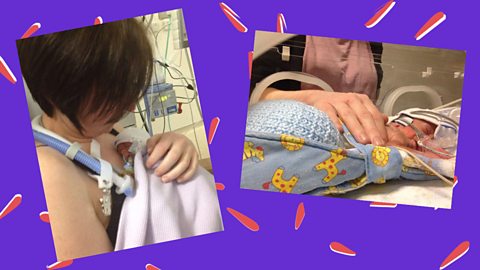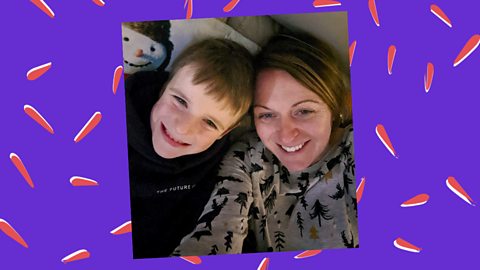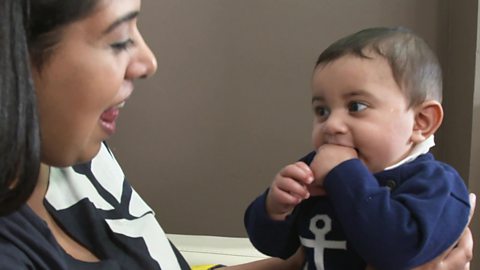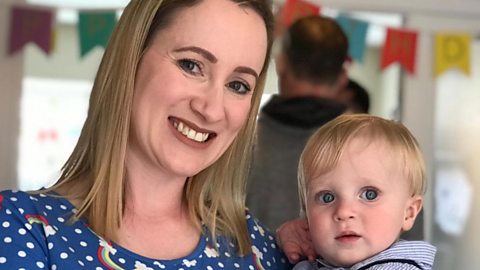Around 60,000 babies are born prematurely in the UK every year, according to the charity Bliss. And if you’re the parent of a premature baby, or any baby in neonatal care, it can be an incredibly emotional and stressful time.
Bonding with babies in neonatal care units may feel challenging when they are in an incubator. Even more so if they are on breathing support or being tube fed and you’re not always able to cuddle or feed them. .
It’s something mum-of-three Kirsten Mitchell from Manchester knows only too well. Her youngest son Tom, now six, was born at 24 weeks. He spent 127 days in neonatal care before his family could take him home.
"If you’ve never been in a neonatal intensive care unit it’s an overwhelming experience," she says. "If the first time you go in is to see your own baby, it’s mind-blowing."
I can only describe it as like walking into a spaceship.

"There are so many tiny babies and lots of wires and machines you’ve never seen before. I felt so scared and so sorry for Tom, he looked so helpless. It seemed like the end of the world."
Kirsten says she struggled to bond with Tom in the first couple of months. “I felt like he belonged to the hospital, and this appears to be very common for parents of babies in neonatal care. My husband struggled as well. You don’t understand what your role is as a parent or even if you have a role."
Following her experience Kirsten set up a charity, to help other families who are experiencing neonatal care.
Here are Kirsten's tips for bonding with your premature baby in hospital…
1. Get involved in your baby’s care
From changing nappies to helping with tube feeds, there are lots of ways you can take an active role in looking after babies in neonatal care.
Kirsten says, ‚ÄúParents are more likely to bond with their baby early on if they feel they have a role. I‚Äôd really encourage mums and dads to get as involved as possible. It could be anything from helping tube feed your baby to changing the sheets in their incubator. By doing things for Tom, it helped me feel more like his parent.‚ÄĚ
2. Stroke and hold your baby
When your baby is so tiny, it can feel scary holding or even touching them. But having the right sort of physical contact can really help with bonding and attachment.
‚ÄúAt first I would put my hands in the incubator and stroke Tom,‚ÄĚ says Kirsten. "I now know premature babies benefit from being touched in a very different way. So, chat to the nurses about positive touch and containment holding (putting your hand on your baby so they feel secure).‚ÄĚ
If your baby can be taken out of the incubator, another way to bond is through against your chest. There are many benefits of skin-to-skin for both baby and parent. It can help regulate your baby's heart rate and temperature. It will also help with bonding and attachment and will help stimulate your breast milk production.
3. Learn your baby’s cues
Getting to know your baby is a huge part of the bonding process. Spend as much time as possible with your baby. No one knows your baby better than you and you can work with the staff to understand your baby's cues.
‚ÄúGetting to know Tom was really important to me,‚ÄĚ says Kirsten. ‚ÄúIt helped me bond with him and helped build my confidence in caring for him. Once I started to get more involved with his care I started to feel more like his mum.
4. Express breast milk for your baby if you're able to
You may be asked to express breast milk for your baby throughout the day and night. This will maintain your milk production; basically the more you express, the more milk you will make. Some mums find it also really helps them, as it's something positive they can do for their baby.
‚ÄúIt isn't always easy but the neonatal unit can support you with any concerns you have regarding expressing,‚ÄĚ adds Kirsten.
5. Mark your baby’s milestones
Your baby may be in hospital, but that doesn’t mean you have to miss their milestone moments.
Kirsten says: "Milestones are huge on the neonatal unit. Your first cuddle is obviously a massive milestone, but other firsts are also so important. You can wait weeks or months to dress your baby for the first time or give them their first bath.
There are so many barriers to being a parent on the neonatal unit. Those first milestones are often your most precious.
6. Talk to your baby
Another great way to bond with your baby is by talking to them. Your baby will know your voice and they will want to hear it as much as possible.
‚ÄúI felt a bit awkward talking to Tom at first and didn‚Äôt know what to say,‚ÄĚ says Kirsten. ‚ÄúBut you can talk about anything ‚Äď even reading out texts from your phone or talking about what you had for lunch. Our charity has a mobile library so parents can borrow books to read to their babies.‚ÄĚ
7. Get to know each other’s smell
Your baby’s sense of smell starts to develop when you’re around 10 weeks pregnant. So even though they’ve arrived early, they will be able to recognise your smell and feel comforted by it.
‚ÄúI used to keep a knitted square in my bra strap and put one in Tom‚Äôs incubator,‚ÄĚ says Kirsten. ‚ÄúI‚Äôd then swap them over so we‚Äôd both have the scent of each other. It helped me with my milk production and I felt it would help him feel more secure. Don‚Äôt wear overpowering perfume though ‚Äď your baby just needs your natural scent.‚ÄĚ
8. Find local support
It’s a huge relief when your baby leaves hospital. But it can sometimes feel like the start of a very different journey when you get them home. Kirsten says finding parents in a similar situation can help, so ask your health visitor about .
‚ÄúYou‚Äôve experienced so much trauma, it can be difficult integrating back into ‚Äėreal life‚Äô."
I was so anxious about taking Tom to standard baby groups because he was still so little.
‚ÄúMeeting up with other parents of babies who had been in neonatal care can make a huge difference. You support each other and this can be a lifeline if you are feeling lonely or isolated. Peer support is so important in a neonatal setting, and even more so in the community.‚ÄĚ

For more information on Spoons' work with families experiencing neonatal care in Greater Manchester,
If you need more information or support, .
The ¬ť∂Ļ‘ľŇń Action Line has details of other organisations that can help too.






